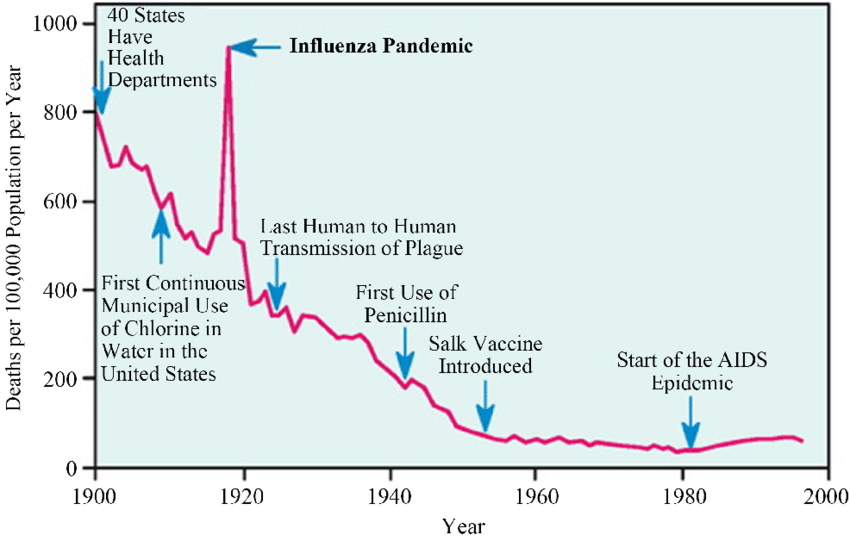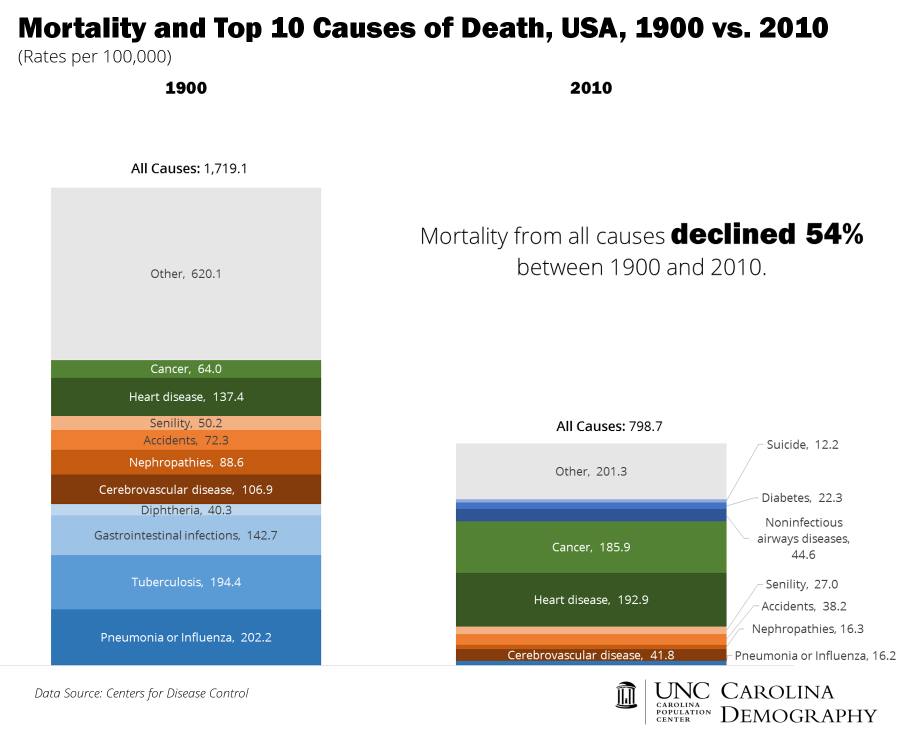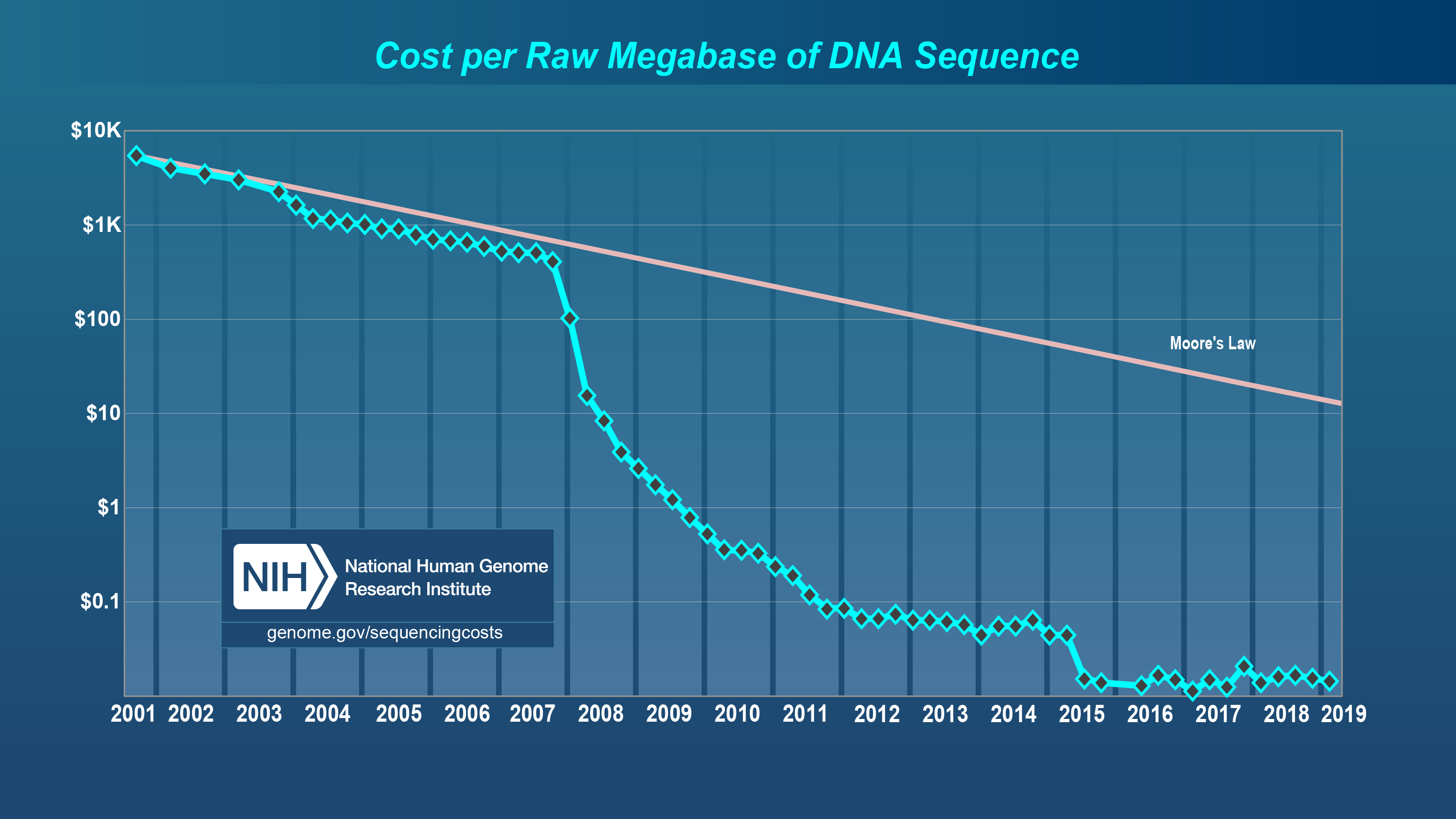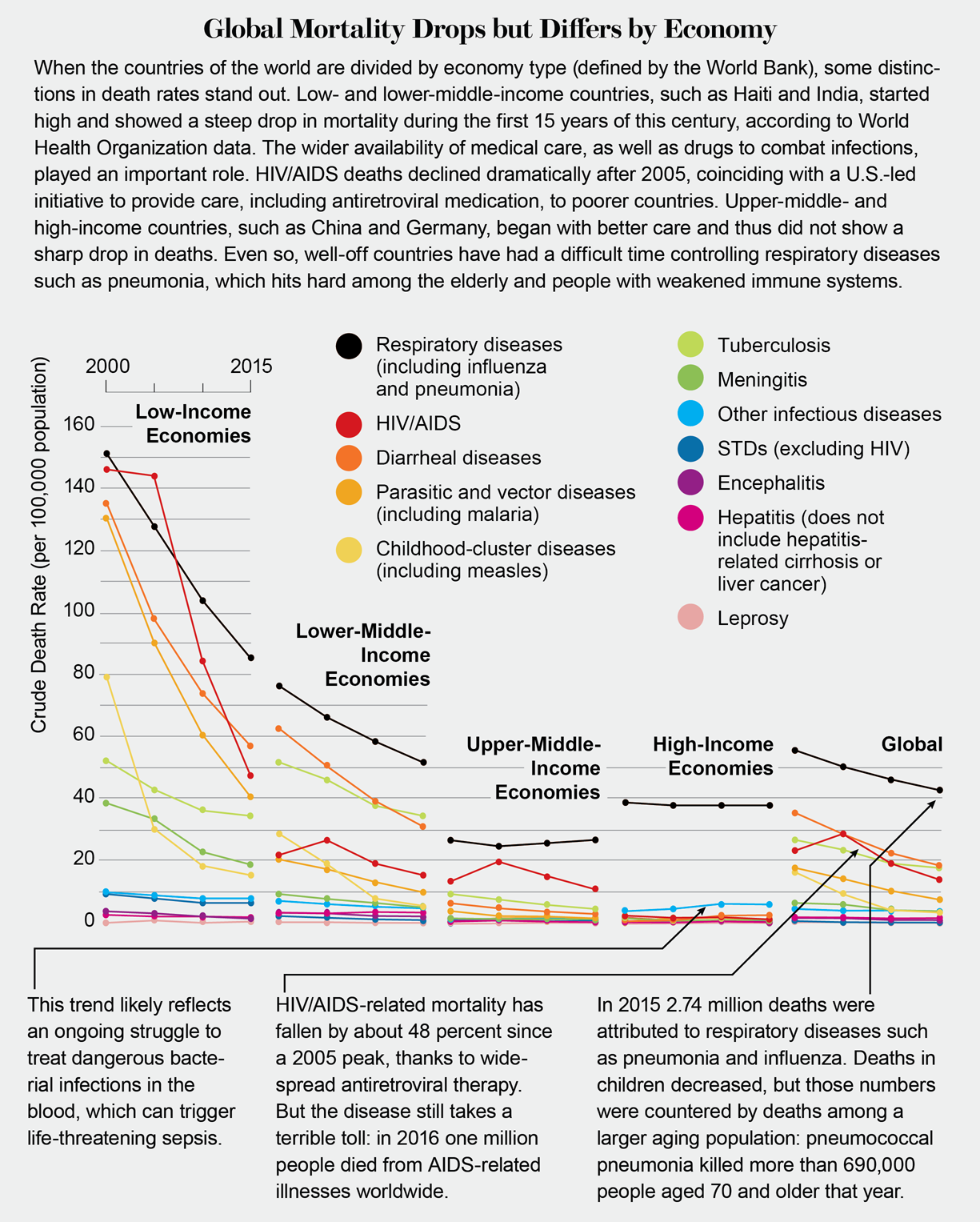Humanity is Winning the Fight Against Infectious Disease
post by lsusr · 2021-08-30T01:31:24.107Z · LW · GW · 8 commentsContents
The World None 9 comments
One of my favorite things about living in the 21st century United States is how so few people die of infectious disease. Here's a graph of deaths showing how infectious diseases decreased by an order of magnitude between the turn of the century and Salk's Polio Vaccine.
In 1900, 12% of deaths were caused by pneumonia and influenza. 11% were caused by tuberculosis. 8% were caused by of diarrhea. A hundred years ago infectious diseases killed over one third of everyone. In contrast, not a single person in my extended social circle has ever died of an infectious disease. I know more people who were killed by airplane crashes than by infectious diseases.
The raw 10× reduction undersells the progress we've made against infectious disease. We have more people overall and we live together in cities. Death due to infectious disease should have skyrocketed over the last century. We would have been fortunate if medicine and sanitation merely kept infectious disease at 1900 levels.
The emergence of new diseases like HIV and COVID-19 has had a tiny impact compared to the overall trend.
In 2019, there were 15,815 deaths among adults and adolescents with diagnosed HIV in the United States and 6 dependent areas. These deaths may be due to any cause.
2,855,000 Americans died in 2019. Those with HIV were 0.5% of the total. Even if we are maximally pessimistic and attribute to HIV every single death of every single American with HIV, this is a tiny fraction compared to how many people used to die of the plagues of 1900.
As of July 20, 2021, COVID-19 killed 600,000 Americans over the course of 1.5 years. That's 400,000 deaths per year. At 13% of total deaths, COVID-19 temporarily increased deaths due to infectious disease back to what we had in the 1940s. But the increase is temporary. We have vaccines. Even if we didn't have vaccines, deaths due to COVID-19 would decrease naturally after it burned through the vulnerable population.
If new diseases emerged while technology stagnated then we'd be living in a temporary golden age―and maybe we are. But biotechnology is advancing faster than any technology ever.
The COVID-19 vaccines were invented and deployed with unprecedented speed. Civilization will only get better at inventing vaccines. I mean, can you plausibly imagine a worse response to COVID-19 than what we experienced in the West?
With biotechnology advancing so quickly, a deliberately engineered bioweapon [LW · GW] (or gain-of-function research) will soon become a greater threat than naturally-occurring pandemics (if it hasn't already).
A bioterror attack is scary, but I don't think it's likely to kill as many Americans in a single year as did ordinary 1900-level tuberculosis. COVID-19 got as bad as it did because we lacked the will to respond appropriately. (China took the pandemic seriously and is doing fine despite being patient zero.) If COVID-19 had been a terrorist attack, the American population would have rallied behind contact tracing and pandemic prevention would have gotten a blank check.
The World
The United States is better protected against infectious disease than ever before. What about the rest of the world? Here is a graph of deaths due to childhood infectious diseases.
Unlike the United States where deaths due to infectious diseases leveled off several decades ago, global childhood deaths due to major infectious diseases have decreased for decades. I predict they will continue to do so. Global deaths due to infectious disease for all people (not just children) have decreased too, especially in the poorest countries. Deaths from to the worst infectious diseases in the poorest counties halved in just fifteen years.
If you look at things on time horizons of centuries―or even just decades―humanity is freer from infectious disease than it has ever been. The situation is rapidly improving too!
8 comments
Comments sorted by top scores.
comment by Adam Zerner (adamzerner) · 2021-08-31T05:51:46.249Z · LW(p) · GW(p)
We might be winning, but by developing technologically as much as we are, I think we are playing with fire when it comes to tail risk and Taleb's idea of fragility.
Replies from: kamil-pabis↑ comment by Kamil Pabis (kamil-pabis) · 2021-09-05T14:50:56.570Z · LW(p) · GW(p)
Do you think this is a problem? It appears to me that no development is possible without some tail risk (which we obviously want to minimize wherever possible!). Can we come up with a realistic world in which technologic progress is used for peaceful purposes exclusively and never causes any negative surprises? Or a world that develops with zero tail risk?
Replies from: adamzerner, None↑ comment by Adam Zerner (adamzerner) · 2021-09-06T20:56:23.021Z · LW(p) · GW(p)
IMO yes, it is a gigantic problem. I agree that there are tradeoffs where progress implies some amount of tail risk as a consequence. The thing is that I don't think we are navigating those tradeoffs well. The analogy I like to use is that our technological progress is like giving a machine gun to a child. Bad things are bound to happen. To use that analogy, when/if we mature to the level of Competent Adult or something, that would be the time to start playing with machine guns.
comment by George3d6 · 2021-08-30T11:08:56.446Z · LW(p) · GW(p)
Humanity is misdiagnosing infectious diseases. Statistically speaking you have a few dozen HPVs and say 0.7 HSVs infecting you. Like, permanently, your immune system can't destroy them, they lay dormant in immunno-privileged areas.
How many other viruses do we misdiagnose as "not there" when really they just act in an undetectable way? hundreds? thousands? millions? I don't think there's a good estimate out there
Bacteria and fungi that cause superficial infections enough to an immune reaction to leaving you with localized genetic and structural damage?
Like yeah, the cause of death is now more vague, it's because the guy was fat and had tumors, and part of being fat and having tumors is just the way the human degrades... but to think that none of it is caused by the trillions of organisms that enter your body every day and our body's reaction to it? I find that unlikely.
It's just that we eliminated all "obvious" infectious disease, but even that will not stay as is. The current prevention measures are just an evolutionary pressure and it's combined with all of us no longer being selected based on our ability to react to infectious disease. I think it's not unreasonable to predict an uptik in this is the trans hummanist future comes to pass, and if it does, then it will be a long time before we're rid of deadly disease, even if the signal is now weaker and more confounded.
Replies from: orthonormal↑ comment by orthonormal · 2021-08-30T18:58:30.043Z · LW(p) · GW(p)
- Overall mortality mortality and morbidity rates don't lie. You can't do enough creative accounting to hide vast amounts of infectious disease mortality within a much longer healthy lifespan.
(And yes, it's healthier on average, even counting obesity. Painful disability was more common in the past.) - The nice thing about sequencing is that eventually it'll be feasible to take a slice of your tissue and identify everything that's not you. Easier to make progress at that point.
- Replacing your cells with nanotech cells that bacteria/viruses/prions/etc can't crack, and which have very solid checksum/error-correcting codes to prevent things like nanotech cancer... you're safe against any non-intentionally-designed attack. (To say nothing of the abstraction layers possible with uploading.)
"Normal" transhumanist technologies aren't perfect, but they are barely epsilon-susceptible to natural infectious diseases.
comment by TheSimplestExplanation · 2021-08-30T13:15:15.359Z · LW(p) · GW(p)
The emergency of new diseases
*emergence
?
been terrorist attack
-> been a terrorist attack
Replies from: lsusrcomment by ChristianKl · 2021-08-31T06:50:23.632Z · LW(p) · GW(p)
The COVID-19 vaccines were invented and deployed with unprecedented speed. Civilization will only get better at inventing vaccines. I mean, can you plausibly imagine a worse response to COVID-19 than what we experienced in the West?
We gambled very high by not using well-understood technology to vaccinate but risky new technology. If the side effects wouldn't just have been making half the people ill the next day, confidence in the overall vaccine effort could have been damaged a lot.
Russia shows how low confidence in the health system can lead to lower vaccination rates and it's quite possible that confidence in our health system also goes down over time.
If we wouldn't have governments that sue people for vaccinating their families but support those people to vaccinate more which we likely would have had 50 years ago, our response would have been much faster.
The case of lyme disease suggest to me that there's a lot of official pressures to deny the harm that it causes in the chronic cases. There's little money into understanding infectious diseases better.





